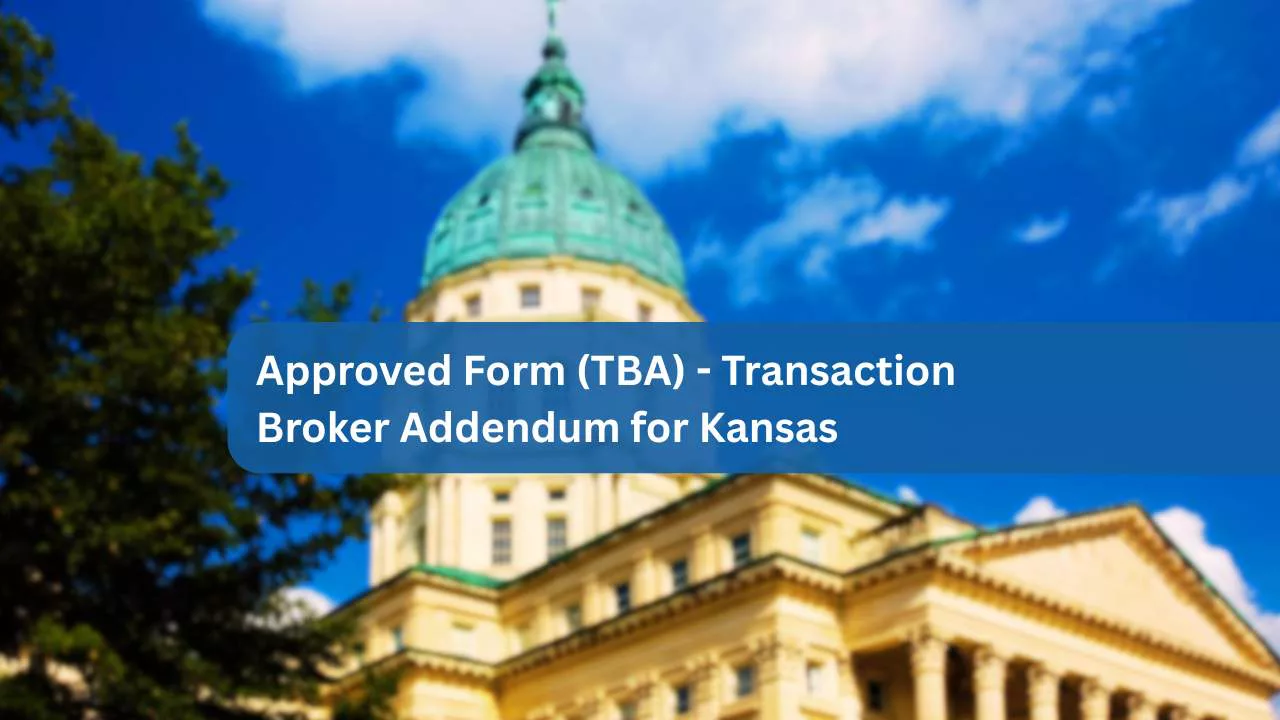In Kansas real estate, clarity around brokerage relationships is key to making sure you are both in legal compliance and consumer trust. One form that plays a central role in this is the Transaction Broker Addendum (TBA), a document required when a licensee transitions from an agent role to that of a transaction broker.
Download the TBA Form, Approved by the Kansas Real Estate Commission
Download the Official Transaction Broker Addendum Form (TBA)
Disclaimer – this is not official legal advice. Please do not use this blog or content here as a replacement for official legal advice. We highly recommend you seek advice about legal matters from licensed legal professional.
What is the Transaction Broker Addendum?
The Transaction Broker Addendum Kansas form is an official amendment used to convert an existing written agency agreement, such as a buyer agency or seller agency agreement, into a written transaction brokerage agreement.
This shift typically happens when the same designated agent is working with both a buyer client and a seller client in the same real estate transaction. Since Kansas prohibits dual agency, this form enables compliance by transitioning all parties to a transaction broker relationship, where the agent assists both sides neutrally.
When Do You Use the TBA Form?
- The same licensee affiliated with a brokerage firm is working with both buyer and seller.
- An exclusive agency agreement is already in place with both parties.
- The designated agent’s supervising broker needs to facilitate the transaction without representing either party.
- A potential conflict of interest arises, and informed consent is needed from both the buyer and seller.
This form must be signed before executing a purchase contract, lot reservation agreement, or any similar transaction document, this should bring full legal disclosure pursuant to K.S.A. 58-30,113 and amendments thereto, assuming it is executed properly (reminder, this is not official legal advice).
Why Does It Matter?
Acting improperly without this addendum could create an implied dual agency situation, a violation of the Kansas Real Estate Commission rules. Using the TBA helps licensees.
- Avoid mishandling confidential information or material defects disclosure.
- Stay compliant in transactions involving property owned by the brokerage or its supervising broker.
- Navigate legal duties as a statutory agent, tenant’s agent, landlord’s agent, buyer’s agent, or seller’s agent in complex real estate deals.
Key Limitations of a Transaction Broker
As a transaction broker, a licensee…
- Does not represent either party in a fiduciary capacity.
- Cannot disclose motivations, price flexibility, or financing terms of either party without written consent, unless dealing with commercial real estate or residential properties with more than four units, where limited disclosure may be permitted unless prohibited.
Stay Protected, Stay Informed
This form protects not only the licensee, but also buyers, sellers, tenants, and landlords who need transparency in their real estate transactions. Always review with your branch broker, seek expert advice as needed, and document every written agreement properly.
Access the Transaction Broker Addendum Form here to make sure your next Kansas transaction is handled with care and clarity.
FAQs – The Brokerage Relationships in Real Estate Transactions Act
When does a licensee have to disclose their role in a transaction?
A licensee involved in a residential transaction must disclose their role (e.g., seller’s agent, buyer’s agent, or transaction broker) at the first practical opportunity—usually when they begin substantive contact with a client.
Who qualifies as an “affiliated licensee”?
An affiliated licensee is any real estate professional who works under the supervision of a broker and represents the broker’s brokerage relationships in transactions.
Can a licensee act for both the buyer and seller?
In Kansas, a licensee cannot be a seller’s agent and a buyer’s agent in the same deal. Instead, they must use a Transaction Broker Addendum to convert the relationship and act neutrally. This prevents unauthorized dual agency among other affiliated licensees as well.
What is considered a “sell agreement” under this law?
A sell agreement typically refers to any contract to transfer real estate, including exclusive right listings, purchase contracts, and related documents that are subject to BRRETA disclosures.
What must not be disclosed without consent?
Licensees pursuant to the act cannot reveal such information as motivation, willingness to accept different terms, or financial limits of any other party, unless required by law or authorized in writing.
Can disclosures be made through verbal authorization?
No. BRRETA requires written agreements for agency roles, and verbal authorization alone is not sufficient to establish agency or make protected disclosures.
Are there exceptions for federal government or agency transactions?
Yes, certain federal agency or federal government transactions may follow different rules. For example, some agency agreements involving federal entities may be oral rather than written.
What if a qualified third party prepares the documents?
If a qualified third party like an attorney prepares the purchase contract, standard disclosure still applies unless the transaction meets very specific exemptions under the law.
About the Author

Joseph E. Stephenson, REALTOR®
License #00054082 | Kansas & Missouri
Affiliated with Welch & Company (License #CO00000477)
Joseph E. Stephenson is a licensed real estate professional in Kansas and Missouri with a career built on dedication to integrity and client-focused service. To learn more about how Joseph can assist you in your real estate endeavors, visit his REALTOR® profile at realtor.com.
Verify Joe’s Real Estate License Credentials
Real Estate Agent License VerificationVerify Joe’s Business Credentials
Joseph E. Stephenson also operates a business named Stephenson Residential, LLC. You can verify the business at the Kansas Secretary of State’s website.
Verify Business Credentials

